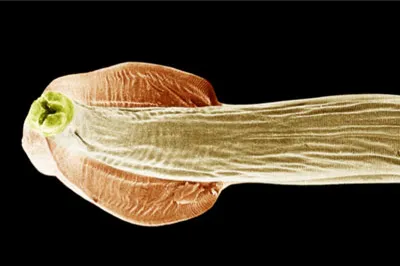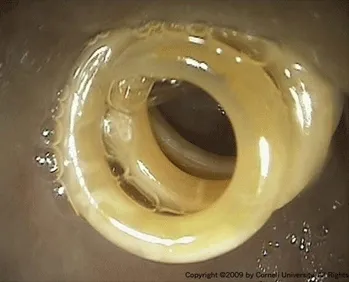Roundworms are incredibly common parasitic worms that reside in the intestines of dogs, affecting nearly all canines at some point in their lives, especially during puppyhood. These resilient parasites can be contracted in various ways, making them easy to spread within the dog population and challenging to control without proper measures. As a dog owner, it’s natural to wonder about the implications for your own health. The direct answer to “Can You Get Roundworm From A Dog” is yes, humans can indeed contract roundworms, primarily from accidental ingestion of eggs present in contaminated environments rather than direct transmission from the dog itself. Understanding the risks and how to protect both your furry friend and your family is crucial for responsible pet ownership.
What are Roundworms and How Do Dogs Get Them?
Roundworms, scientifically known as Toxocara canis in dogs, are intestinal parasites that resemble spaghetti strands, typically white or light brown and several inches long. Their life cycle is complex, contributing to their widespread nature. Dogs can become infected with roundworms in multiple ways:
- Transplacental (In Utero) Transmission: Often, puppies are born with roundworms because the mother dog, if infected, can pass the larvae to her unborn puppies through the placenta while they are still in her womb. This is why puppies are frequently infected from birth.
- Transmammary (Milk) Transmission: After birth, puppies can also ingest worm larvae through their mother’s milk while nursing.
- Environmental Contamination: Dogs, especially puppies, can become infected by ingesting larvated eggs from contaminated soil, grass, or feces in their environment. Roundworm eggs are incredibly hardy and can survive in the soil for months or even years.
- Prey Ingestion: If a dog eats small animals like mice, birds, or other mammals that harbor roundworm larvae in their tissues, the dog can become infected.

Signs Your Dog May Have Roundworms
While many adult dogs might not show obvious signs of a roundworm infection, particularly with minor infestations, puppies with significant worm burdens are more likely to exhibit noticeable symptoms. These can include:
- Pot-bellied appearance: This is a classic sign in puppies, where their abdomen appears distended and rounded due to the large number of worms.
- Dull coat: A healthy, shiny coat can become dull and lack luster.
- Diarrhea: Soft or watery stools are common. In severe cases, you might observe that can roundworms cause bloody diarrhea in dogs.
- Vomiting: Dogs may vomit, and sometimes adult worms can be seen in the vomit.
- Weight loss or failure to thrive: Despite eating, infected dogs may not gain weight or may lose it due to the worms competing for nutrients.
- Coughing: If roundworm larvae migrate through the lungs during their life cycle, it can trigger a cough.
- Visible worms: Adult roundworms may be seen in the dog’s feces or vomit, appearing as white or light brown, spaghetti-like strands.
Diagnosing and Treating Roundworms in Dogs
Diagnosing roundworms typically involves a veterinarian performing a fecal examination. A small sample of your dog’s stool is examined under a microscope to look for the characteristic eggs of the roundworm. Since these eggs are shed intermittently, multiple samples might be needed for an accurate diagnosis.
Treatment usually consists of deworming medications, often prescribed by a veterinarian. These medications work by paralyzing or killing the worms, which are then passed in the dog’s stool. It’s important to note that most dewormers only kill adult worms, not the migrating larvae. Therefore, multiple doses are usually required over several weeks to effectively eliminate the parasites as more larvae mature into adults. Following your veterinarian’s recommended deworming schedule is critical, especially for puppies, to break the worm’s life cycle. For comprehensive parasite control, consulting your vet about the best flea and worm treatment for dogs is always a good idea.
Preventing Roundworm Infections in Dogs
Prevention is key to controlling roundworms and involves a combination of good hygiene and regular veterinary care:
- Maintain Cleanliness: Regularly clean your dog’s living areas, including crates, bedding, and play spaces, to reduce the presence of roundworm eggs.
- Prompt Fecal Removal: Remove dog feces from your yard or any shared public spaces immediately. Roundworm eggs in feces become infective after a few days, so quick removal minimizes environmental contamination.
- Prevent Scavenging: Try to prevent your dog from eating wild animals, such as rodents or birds, which can be intermediate hosts for roundworm larvae.
- Strategic Deworming for Puppies: Puppies should receive deworming treatments at 2, 4, 6, and 8 weeks of age. This aggressive schedule targets worms acquired from the mother.
- Regular Deworming for Adults and Nursing Mothers: Adult dogs, especially those that spend time outdoors, should be dewormed regularly. Nursing mothers should be dewormed concurrently with their puppies to reduce transmission risk. Many monthly heartworm preventives also offer protection against roundworms.
- Fecal Examinations: Have your veterinarian perform fecal examinations 2 to 4 times during your dog’s first year of life and at least 1 or 2 times annually for adult dogs.

The Crucial Question: Can Humans Get Roundworm from a Dog?
This is a critically important question for pet owners: Yes, humans can get roundworm from a dog. While direct transmission from dog to human (e.g., through a bite or saliva) is not the typical route, roundworms pose a significant zoonotic risk, meaning they can be transmitted from animals to humans. The primary way humans become infected is by accidentally ingesting microscopic roundworm eggs. These eggs are shed in the feces of infected dogs and can accumulate in significant numbers in contaminated soil, sandboxes, or other environments where pets defecate.
Children are particularly at risk because they often play in dirt or sand, put their hands in their mouths, and may not practice good hygiene. Adults can also be infected, especially gardeners or anyone who works with soil. If you’re wondering can I get roundworm from my dog through casual contact, remember it’s the environment, not usually direct contact with your dog’s fur, that carries the highest risk.
Symptoms and Risks of Roundworm Infection in Humans
Once ingested, roundworm eggs hatch in the human intestine, and the larvae migrate through various organs, a condition known as Visceral Larval Migrans (VLM). The symptoms in humans depend on where the larvae travel:
- Visceral Larval Migrans (VLM): Larvae can travel to organs like the liver, lungs, heart, or brain, causing inflammation and damage. Symptoms can be vague, including fever, cough, abdominal pain, or fatigue.
- Ocular Larval Migrans (OLM): If larvae migrate to the eye, they can cause vision loss, inflammation, and even blindness in one eye. This is a severe form of the disease.
- Neurological Signs: In rare but serious cases, larvae migrating to the brain can cause neurological problems.
It’s important to seek medical attention if you suspect you or a family member might have been exposed to roundworms or are showing symptoms.
Protecting Your Family from Canine Roundworms
Protecting your family from roundworm infection is an essential part of responsible pet ownership.
- Practice Excellent Hygiene: Always wash your hands thoroughly with soap and water after handling your dog, cleaning up feces, gardening, or playing outdoors. This is especially important for children.
- Supervise Children’s Play: Do not allow children to play in areas where animals have defecated. Cover sandboxes when not in use to prevent pets from using them as litter boxes.
- Prompt Fecal Cleanup: Pick up your dog’s feces immediately and dispose of it properly. Use gloves or a bag to avoid direct contact.
- Regular Veterinary Care: Ensure your dog receives regular veterinary check-ups, including routine fecal exams and appropriate deworming treatments as recommended by your vet. This also applies to other common parasites; for instance, understanding if can you get ear mites from dogs and how to prevent them contributes to overall pet and human health. Maintaining good pet hygiene and proactively addressing any parasitic issues, such as knowing the best way to get rid of ear mites in dogs, significantly reduces environmental contamination.
Conclusion
Roundworms are a common concern for dog owners, not just for the health of their pets but also due to the potential risk to humans. Understanding how dogs contract these parasites, recognizing the signs of infection, and implementing effective prevention strategies are paramount. While the thought of contracting roundworms from your beloved dog can be alarming, following strict hygiene practices, adhering to your veterinarian’s deworming schedule, and promptly cleaning up pet waste can significantly minimize the risk of transmission to your family. Always consult your veterinarian for the best advice on parasite control tailored to your dog’s specific needs and environment.
References
- CAPC (Companion Animal Parasite Council). (n.d.). Ascarid Guidelines. Retrieved from https://www.capcvet.org/guidelines/ascarid/
- Pets & Parasites. (n.d.). Roundworms. Retrieved from https://www.petsandparasites.org/dog-owners/roundworms/
